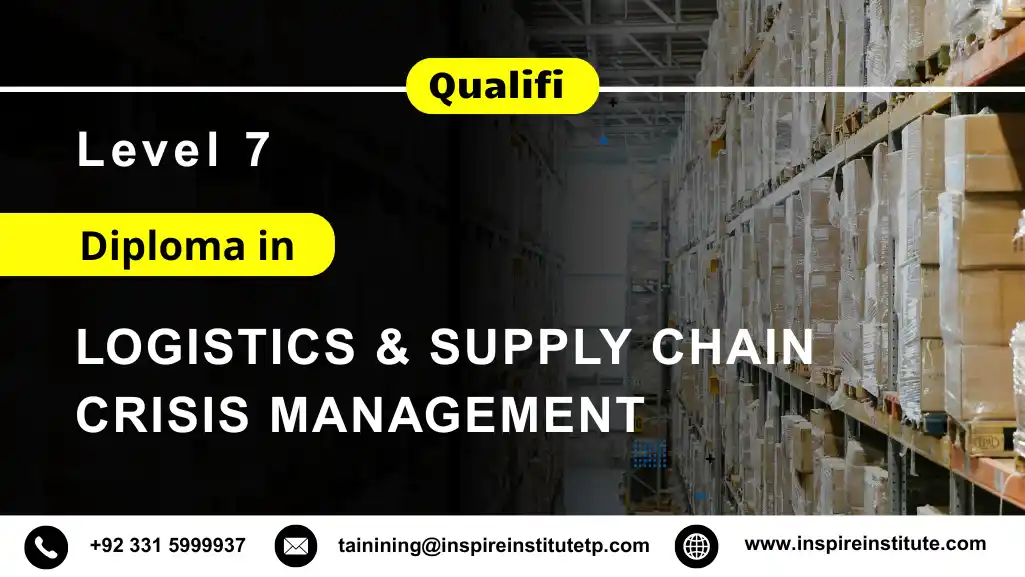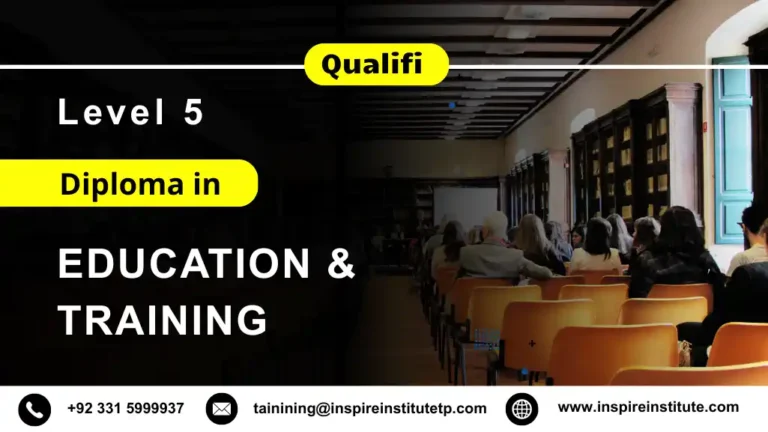Qualifi Level 7 Diploma in Logistics and Supply Chain Crisis Management
The Qualifi Level 7 Diploma in Logistics and Supply Chain Crisis Management is a postgraduate-level qualification designed to equip senior professionals and aspiring leaders with the strategic skills needed to manage disruptions and build resilience in global supply chains. Focusing on crisis planning, risk management, and operational continuity, the programme prepares learners to navigate complex challenges in an increasingly volatile business environment. Regulated by Ofqual and aligned with Level 7 of the RQF, it also provides a pathway to further academic study or senior leadership roles in logistics and supply chain management.
Why Choose this Qualification?
The Qualifi Level 7 Diploma in Logistics and Supply Chain Crisis Management is a globally recognized and Ofqual-regulated qualification designed for professionals seeking to lead and innovate in supply chain operations, particularly in high-risk and uncertain environments. This diploma equips learners with advanced strategies and practical tools to manage disruptions, build resilient logistics networks, and ensure business continuity in a rapidly evolving global market.
- Ofqual-Regulated and Internationally Respected
This qualification is regulated by Ofqual (UK), ensuring it meets rigorous academic and professional standards. Recognized by employers, universities, and industry bodies worldwide, it enhances your career prospects across international markets and sectors. - Comprehensive Crisis and Supply Chain Curriculum
The course covers key topics including logistics strategy, supply chain risk management, emergency planning, operational resilience, procurement during crises, and stakeholder communication. It prepares you to lead confidently during supply chain disruptions and global challenges. - Career Pathway to Senior Logistics and Supply Chain Roles
Graduates are well-positioned for senior roles such as Supply Chain Director, Logistics Manager, Crisis Response Lead, Operations Director, and Business Continuity Manager across industries including manufacturing, retail, healthcare, transport, and energy. - Practical and Assignment-Based Learning
Focusing on real-world application, the programme uses an assignment-based assessment model instead of exams. Learners apply strategic concepts through practical case studies and workplace projects, ensuring industry-relevant competence. - Flexible Online Learning Format
Designed for working professionals, the course offers flexible online delivery, allowing learners to study at their own pace from any location. It is ideal for international students and busy professionals balancing career responsibilities. - Aligned with Global Industry Standards
The curriculum reflects best practices and global frameworks in logistics and risk management, aligning with standards from organizations such as the Chartered Institute of Logistics and Transport (CILT), ISO, and global supply chain compliance protocols. - Academic and Career Advancement Opportunities
This Level 7 diploma provides a pathway to further postgraduate study, including MBAs and MSc programmes in logistics, supply chain management, or business strategy. It also facilitates advancement into strategic leadership roles. - Rising Demand for Crisis-Ready Supply Chain Professionals
As global supply chains face increasing volatility from pandemics, geopolitical shifts, and climate events, skilled professionals are in high demand. This diploma ensures you’re equipped with the critical capabilities to lead in complex and high-stakes environments.
Choosing the Qualifi Level 7 Diploma in Logistics and Supply Chain Crisis Management is the strategic step for professionals who want to lead with confidence, resilience, and global impact.
Course Overview
Ofqual Regulated Qualification
Course Level: 7
Average Completion Time:
6-24 Months
Study Units: 5 Units
Evidence & Assignment Based
Qualification Structure
The Qualifi Level 7 Diploma in Logistics and Supply Chain Crisis Management qualification is structured to provide 120 credits at Level 7 and is regulated by Ofqual (Office of Qualifications and Examinations Regulation, UK).
Mandatory Units
- Critical Issues: Strategic Framework for Understanding Risk and Resilience Building
- Engineering Systems Views of Supply Chain Resilience
- Sector Specific Supply Chain Resilience Management
- Ethical and Social Supply Chain Management
- Critical Issues: Supply Chain Crime, Corruption and Terrorism
- Critical Issues: Management of Supply Chains during Natural Disasters, Climate Change and Pandemics
Who Should Take This Course
The Qualifi Level 7 Diploma in Logistics and Supply Chain Crisis Management is ideal for professionals who are currently working in, or aspiring to enter, senior roles within logistics, supply chain management, or operations—particularly those responsible for managing risk, continuity, and crisis response. It is well-suited for:
- Logistics Managers and Supply Chain Professionals looking to enhance their strategic and crisis management capabilities
- Operations and Risk Management Executives aiming to strengthen their ability to respond to global disruptions
- Project and Procurement Managers responsible for maintaining supply continuity and managing supplier risk
- Business Continuity and Crisis Response Coordinators seeking formal recognition and development of their expertise
- Mid- to Senior-Level Professionals in industries such as manufacturing, retail, healthcare, transportation, energy, and government
- Entrepreneurs and Consultants who advise or operate within complex supply chain environments
- Postgraduate Learners or Career Changers looking to move into logistics or crisis management at an advanced level
Whether you are advancing your current career, transitioning to a leadership role, or preparing for further academic study, this diploma provides the tools and credentials to thrive in high-stakes, global supply chain environments.
Course Benefits
Enrolling in the Qualifi Level 7 Diploma in Logistics and Supply Chain Crisis Management offers a range of valuable benefits, including:
- Global Recognition
Earn a qualification regulated by Ofqual and recognized by employers, universities, and professional bodies worldwide. - Enhanced Career Prospects
Open doors to senior roles such as Supply Chain Manager, Crisis Management Lead, Operations Director, or Business Continuity Specialist. - Strategic and Practical Expertise
Gain in-depth knowledge and hands-on skills in risk management, emergency planning, logistics strategy, and operational resilience. - Flexible, Online Learning
Study at your own pace from anywhere in the world, making it ideal for working professionals and international learners. - Assignment-Based Assessment
Demonstrate your knowledge through practical assignments and case studies—no formal exams required. - Pathway to Postgraduate Study
Use this Level 7 diploma as a stepping stone to an MBA, MSc, or other advanced qualifications in business or logistics. - Industry-Relevant Curriculum
Learn frameworks and best practices aligned with global standards such as ISO, CILT, and international compliance protocols. - Develop Crisis Leadership Skills
Build confidence in leading through uncertainty, managing complex supply chain disruptions, and making data-driven decisions under pressure.
This qualification empowers you to meet the growing demand for skilled professionals who can navigate global supply chain challenges with confidence and competence.
Eligibility Criteria
To enroll in the Qualifi Level 7 Diploma in Logistics and Supply Chain Crisis Management, applicants should meet the following criteria:
Academic Qualifications
A Level 6 qualification (such as a Bachelor’s degree) or an equivalent overseas qualification in a relevant subject such as business, logistics, operations, or supply chain management.
Work Experience (if no formal degree)
Mature learners (aged 25 and above) with a minimum of 5 years of relevant work experience in logistics, supply chain, operations, or crisis management may be considered based on their professional background.
English Language Proficiency
For non-native English speakers, a minimum IELTS score of 6.0 (or equivalent) is recommended unless previous education or professional experience was conducted in English.
Commitment to Learning
Applicants should demonstrate motivation, the ability to work independently, and a strong interest in advancing within the logistics and supply chain sector.
Meeting the eligibility criteria ensures that learners are well-prepared to engage with the strategic and advanced content of this Level 7 qualification. Whether you come from an academic background or bring significant industry experience, this diploma supports your growth into a leadership role in a high-demand field.
The Qualification Process
The Qualifi Level 7 Diploma in Logistics and Supply Chain Crisis Management is designed to be practical, flexible, and aligned with industry needs. The qualification process typically involves the following steps:
1. Enrollment and Induction
After meeting eligibility requirements, learners enroll with an approved training provider. An induction session introduces the course structure, learning methods, and assessment procedures.
2. Learning and Development
Learners study the core units through a mix of online materials, tutorials, and self-directed research. The curriculum covers critical topics such as risk management, crisis response, logistics strategy, and supply chain resilience.
3. Assignment-Based Assessment
Instead of formal exams, learners complete assignments and projects based on real-world scenarios. These assessments demonstrate their ability to apply theory to practical challenges in logistics and supply chain crisis management.
4. Workplace Evidence and Reflection
Where applicable, learners collect evidence from their workplace, such as reports, case studies, or management reviews. Reflective accounts help demonstrate understanding and professional development.
5. Ongoing Support and Feedback
Throughout the programme, learners receive guidance and feedback from qualified assessors and tutors to support their progress and ensure they meet the qualification standards.
6. Final Review and Award
Upon successful completion of all units and assessments, the learner’s portfolio is reviewed. Once verified, the learner is awarded the Qualifi Level 7 Diploma in Logistics and Supply Chain Crisis Management.
This structured yet flexible qualification process is designed to accommodate the busy schedules of working professionals while maintaining high academic and professional standards. By focusing on practical assignments and real-world application, learners develop the confidence and expertise needed to tackle complex supply chain challenges effectively.







